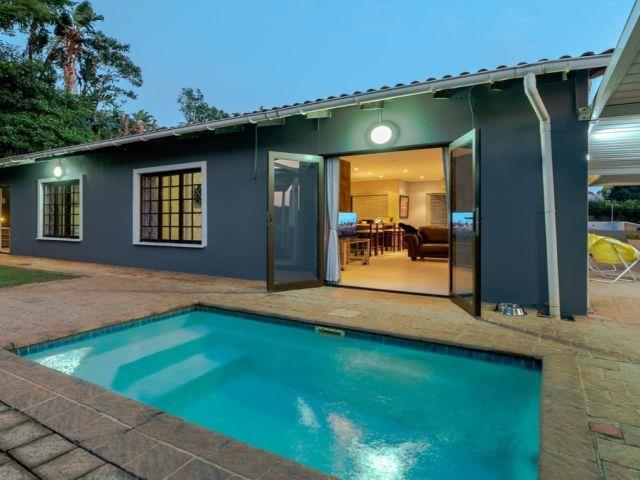The real estate market in KZN remains resilient despite a series of unfortunate occurrences within the region, including last year’s riots and the recent flooding.

Grant Gavin, Broker/Owner of RE/MAX Panache, explains that the demand for real estate is in part owing to the attractive outdoor coastal lifestyle that the province offers residents.
Despite the external circumstances, KZN continues to have the second highest median asking price in the country. According to Lightstone, Coastal areas are growing in price more than non-coastal areas.
“In Durban North, residential homes have an average selling price of R3.5 million. In La Lucia, prices average at around R4 million. In Glenashley, the average price is around R3.4 million, and in Umhlanga, prices average R4.5 million,” says Grant Gavin, Broker/Owner of RE/MAX Panache.
As a possible explanation for the ongoing demand on the KZN North Coast, Gavin explains that there has been a significant shift in buyer behaviour since the pandemic. “Purchasers are seeking properties with attractive lifestyle benefits. People no longer need to work from an office and can therefore choose a property that offers lifestyle benefits as opposed to proximity to work.”

“The KZN North Coast provides exactly that. With a natural coastline as a border, there is a narrow corridor of land from Durban heading north between the N2 and the ocean. Not only is coastal land extremely valuable, but with our year-round warm climate, warm ocean temperature, and access to KZN game reserves, it really is an attractive lifestyle option and one of the best places to live in South Africa,” says Gavin.
KZN North has currently *1 675 new property listings, according to Property24 Trends Data, with the average asking price being R2.7 million vs the average selling price R1.4 million.
The average sale price per erf for 2021 was about R1.15 million, while Section Scheme Units average sale price for the same period is R1.699 900.
The latest residential listings on Property24 show that three-bedroom homes are most widely available, at an average list price of R3.1 million.
68.4% of the sellers are older than 49 years old, while 64.7% of buyers are younger than 49 years old.
Click here to see all the sale and listing price trends in KZN North

However, he notes that as with any major external event, such as last year’s riots and the recent flooding, there is an immediate impact on sentiment in the market and the initial period that follows sees a softening of demand.
“The market did go quiet initially. However, the bounce back has been quick, largely owing to the affordability that the current low interest rates have brought to the market. Obviously, certain areas were impacted more than others and where massive infrastructure work is needed, the bounce back can take longer. The positive stance to take in areas such as these is that when rebuilding, investment flows and infrastructure tends to be improved, which can have a positive impact on the long-term prospects of that area,” says Gavin.
Factoring in the latest interest rate hikes and how that might affect demand, Gavin adds that interest rates are the single biggest factor that impacts demand in any property market.
“The recent interest rate hikes have not had a major impact on our market just yet; we certainly have not seen any significant slowdown in the North Durban suburbs. This is due to current rates, although higher than 2020, being at a level that is lower than our historical interest rate averages in South Africa.”

“For example, at our current rate of 9%, we are still at a lower rate than the 10% rates we experienced pre-COVID. Should the interest rates continue in their upward trend, we will see the impact on affordability eventually start to kick in and, along with other inflationary economic pressures, a shift in demand will naturally occur,” he predicts.
Regional Director and CEO of RE/MAX of Southern Africa, Adrian Goslett, echoes these predictions but adds that it is difficult to know exactly what lies ahead for the greater South African housing market if interest rates continue to climb.
“My advice is to prepare for the worst and to expect the best because the South African property market has continued to perform far greater than predicted across all regions ever since COVID struck back in 2020. Still, it is always better to be well prepared and not need it, than to be unprepared if things do take a turn for the worse,” he says.
Want all the latest property news and curated hot property listings sent directly to your inbox? Register for Property24’s Hot Properties, Lifestyle and Weekly Property Trends newsletters or follow us on Twitter, Instagram or Facebook.
*Property24 Listings Data Disclaimer: The trends detailed in this article are based on Property24 listings, current at the time of publishing, and property transfer data supplied by Deeds offices, which typically take 3-4 months to reflect. Suburbs are listed according to Property24's geographical database. In some areas this will include both commercial and residential properties. The age demographic data of buyers, sellers and stable owners is determined over a six-month period. These Property Values should not be used as a substitute for independent professional advice and is subject to Property24.com Terms and Conditions.







